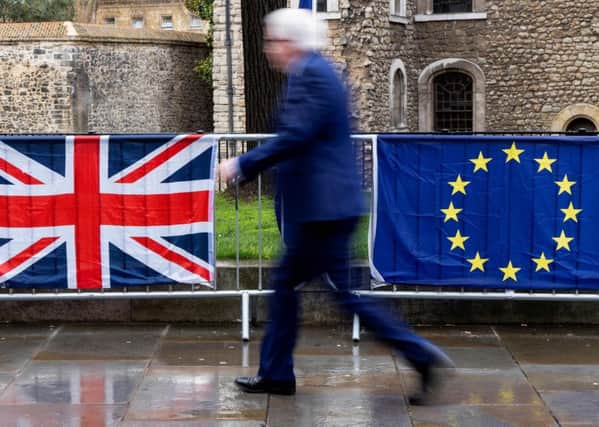Comment: Industry must prepare for deal or no-deal Brexit


As we accelerate towards the 31 October deadline, the prospect of a no-deal Brexit grows more likely. Assuming there is no U-turn from the new Prime Minister over the scheduled departure date and no withdrawal agreement can be reached, businesses will have to respond immediately to a new trading environment under World Trade Organisation (WTO) rules with no transition period to cushion the impact.
While we have heard a lot about the sums being spent by both the UK and EU governments in preparing for a no-deal scenario, many businesses here remain uncertain about how this outcome will affect them and, more so, what they can actually do about it.
Advertisement
Hide AdAdvertisement
Hide AdIt is important to highlight that there are practical steps that Scottish businesses currently trading within the EU can take to mitigate the consequences of no-deal. For starters, they should familiarise themselves with the applicable customs formalities in the event of a no-deal Brexit. This will also be an issue for those firms which do business with the approximately 70 countries with which the EU has trading arrangements (such as Canada) but where the UK will not yet have separate arrangements in place. I would urge business owners to consider applying for the government grants that are available for the costs of customs training.
Businesses must also determine whether they need to apply for a UK Economic Operator Registration and Identification number. They may also need to consider appointing an agent to assist with import/export declarations.
In the event of a no-deal, exporters and importers will face new tariff and quota regimes. Under WTO rules there are agreed maximum tariffs across a spectrum of goods that will be applied on UK exports by the EU and countries with which they have trading agreements. There would also be non-tariff barriers to contend with. These include technical standards, regulations or certification requirements in each case which may apply to a product or service or to packaging and labelling.
Movement of people post-Brexit has been a contentious issue. The UK has implemented a system for EU nationals to apply for settled status but there will be different rules for those arriving here after Brexit. Businesses with EU workers can support them with applications to ensure they are compliant. In the longer term, UK companies may need to consider changing their approach to recruitment, retention and motivation.
Meanwhile businesses with UK employees based in the EU must also prepare for no-deal. Generally companies with permanent bases in EU countries will need to consider ongoing compliance with the local legal requirements which are likely to apply differently after Brexit.
The potential impact of a no-deal scenario on goods transportation is another key factor that is very likely to create additional backlogs at ports. It is therefore essential for exporting and importing businesses, as well as the hauliers and logistics companies which service them, to plan accordingly. This could include stockpiling goods, both in the UK and EU, to allow for “just-in-time” production demand to be met.
Disruption to the transfer of data between the EU and UK is another key concern. Post no-deal Brexit, the UK data transfer regime will need to pass the EU’s adequacy assessment which, although a formality, could take some time. Businesses which rely on an ongoing smooth transfer should consider incorporating additional legal language into any arrangements with an EU counterparty from which data would be received.
UK exporters and importers may also need to examine existing contracts with EU suppliers and customers. These might need to be renegotiated or terminated as a result of a no-deal Brexit. Force majeure clauses will also need to be reviewed. It is particularly important that trading contracts adequately clarify the terms for conducting business across EU borders, including how tariffs, border delays and VAT are all dealt with.
Advertisement
Hide AdAdvertisement
Hide AdHMRC intends to reintroduce postponed accounting for duties and VAT due on imports from “third countries” including EU member states. This should mean that they don’t need to be settled immediately at a port but can be settled through the company’s VAT return. Exporting or importing companies should be seeking professional advice on this critical point now.
Taking practical steps now can help reduce the anxiety currently being felt within many Scottish and UK companies. This will not, however, provide the assurance that would come with a formal withdrawal agreement and orderly Brexit. That’s one for the politicians to deliver.
- Kenny Rose, partner and member of the Brexit Group at CMS